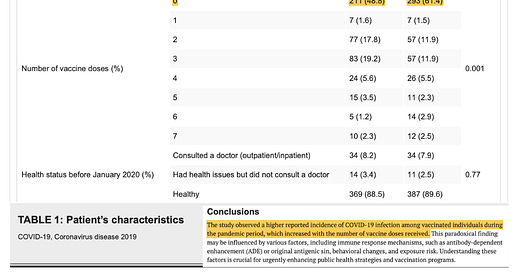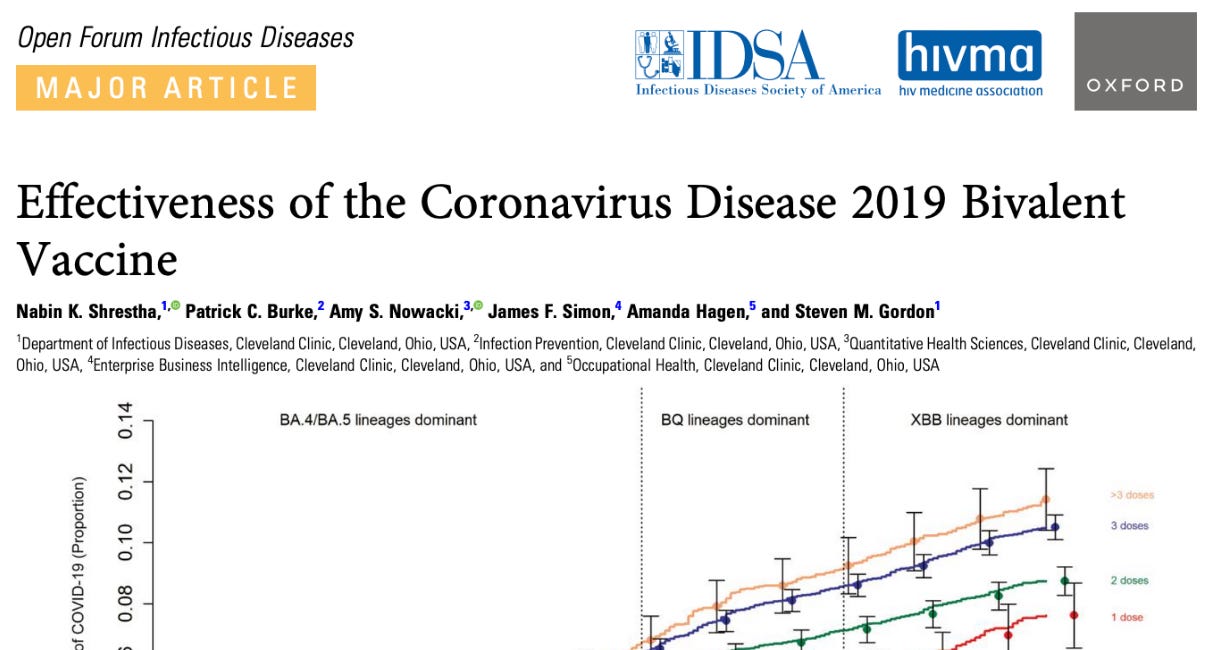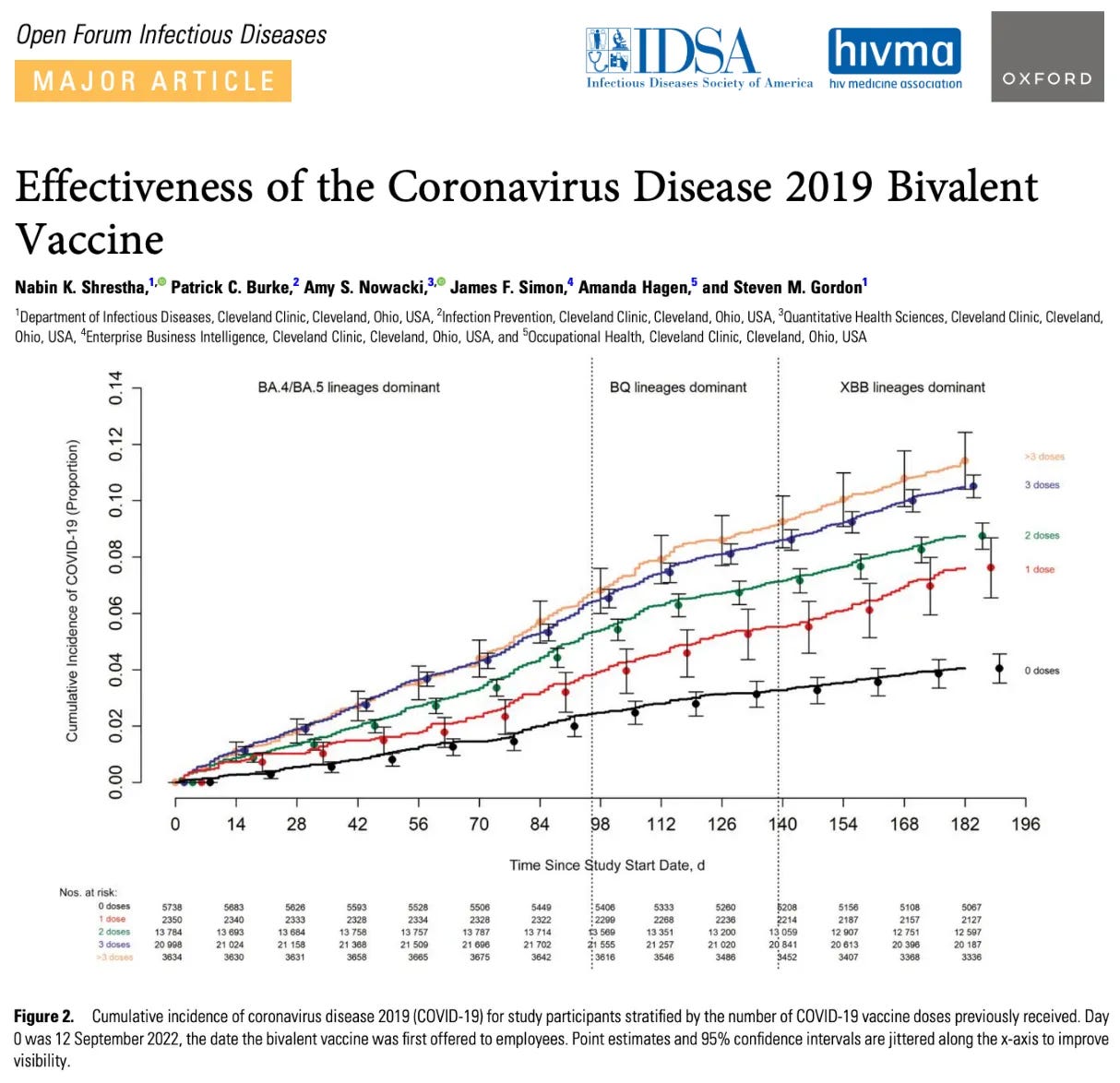NEW STUDY - COVID-19 mRNA Injections Dose-Dependently Increase Risk of SARS-CoV-2 Infection by Up to 121%
Findings reinforce evidence of negative efficacy with repeated doses.
by Nicolas Hulscher, MPH
Last month, I summarized the four primary studies that demonstrate negative efficacy of COVID-19 mRNA injections:
There’s now another study to add to the list: Behavioral and Health Outcomes of mRNA COVID-19 Vaccination: A Case-Control Study in Japanese Small and Medium-Sized Enterprises published in the journal Cureus. They found the following:
Background
Despite ongoing waves of Coronavirus disease 2019 (COVID-19) infections, including significant surges such as the 10th wave, understanding the impact of messenger RNA (mRNA) COVID-19 vaccination on infection risk and associated behavioral changes remains crucial. This study aims to urgently evaluate the effects of mRNA COVID-19 vaccination on COVID-19 infection rates and related behaviors among participants of the Yamato Project, which includes employees of Japanese small and medium-sized enterprises (SMEs).
Methods
A case-control study was conducted using data collected from a survey administered by the Japan Small and Medium Enterprise Management Council in December 2023. Participants included individuals who were part of the Yamato Project, not necessarily limited to SME employees. The survey gathered information on demographic characteristics, COVID-19 infection status, vaccination history, health status before January 2020, and various preventive behaviors. The primary outcome was the presence or absence of COVID-19 infection. Data were analyzed using univariate and multivariate logistic regression models to calculate odds ratios (ORs) and 95% confidence intervals (CIs) for the association between vaccination status and COVID-19 infection.
Results
A total of 913 participants were included in the final analysis. The adjusted ORs for COVID-19 infection among vaccinated individuals compared to unvaccinated individuals were 1.85 (95% CI: 1.33-2.57, p < 0.001). The odds of contracting COVID-19 increased with the number of vaccine doses: one to two doses (OR: 1.63, 95% CI: 1.08-2.46, p = 0.020), three to four doses (OR: 2.04, 95% CI: 1.35-3.08, p = 0.001), and five to seven doses (OR: 2.21, 95% CI: 1.07-4.56, p = 0.033). Behavioral analysis indicated that a reduced frequency of bathing and exercising was significantly associated with higher COVID-19 infection rates (p < 0.05).
Conclusions
The study observed a higher reported incidence of COVID-19 infection among vaccinated individuals during the pandemic period, which increased with the number of vaccine doses received. This paradoxical finding may be influenced by various factors, including immune response mechanisms, such as antibody-dependent enhancement (ADE) or original antigenic sin, behavioral changes, and exposure risk. Understanding these factors is crucial for urgently enhancing public health strategies and vaccination programs.
Here’s what the results mean:
Overall Risk for Vaccinated Individuals (All Doses Combined)
Adjusted OR = 1.85 (95% CI: 1.33–2.57)
This means vaccinated individuals had an 85% increased odds of COVID-19 infection compared to unvaccinated individuals.
Risk by Number of Vaccine Doses:
1–2 Doses: Adjusted OR = 1.63 (95% CI: 1.08–2.46)
→ This corresponds to a 63% increased odds of COVID-19 infection compared to unvaccinated individuals.3–4 Doses: Adjusted OR = 2.04 (95% CI: 1.35–3.08)
→ This corresponds to a 104% increased odds of COVID-19 infection compared to unvaccinated individuals.5–7 Doses: Adjusted OR = 2.21 (95% CI: 1.07–4.56)
→ This corresponds to a 121% increased odds of COVID-19 infection compared to unvaccinated individuals.
This corroborates findings from the Cleveland Clinic study, Effectiveness of the Coronavirus Disease 2019 Bivalent Vaccine, that also found a dose-dependent increased risk of infection:
1 dose: HR = 2.07 (95% CI: 1.70–2.52)
Individuals with one prior dose had a 107% increased risk of COVID-19 compared to those with no prior doses.2 doses: HR = 2.50 (95% CI: 2.17–2.89)
Individuals with two prior doses had a 150% increased risk of COVID-19 compared to those with no prior doses.3 doses: HR = 3.10 (95% CI: 2.69–3.56)
Individuals with three prior doses had a 210% increased risk of COVID-19 compared to those with no prior doses.More than 3 doses: HR = 3.53 (95% CI: 2.97–4.20)
Individuals with more than three prior doses had a 253% increased risk of COVID-19 compared to those with no prior doses.
The COVID-19 mRNA injections have not only failed completely but also appear to act as infection promoters. The world would likely have fared significantly better against the SARS-CoV-2 bioweapon without them.
Nicolas Hulscher, MPH
Epidemiologist and Foundation Administrator, McCullough Foundation
www.mcculloughfnd.org
Please consider following both the McCullough Foundation and my personal account on X (formerly Twitter) for further content.








Antibody dependent enhancement of viral pathogenicity (ADE) was widely feared, until it appeared in summer 2021.
It was assiduously ignored thereafter.
;-(
Pfizer knows this and doesn't care. That's why they wanted 75 years to hide all their data on it...